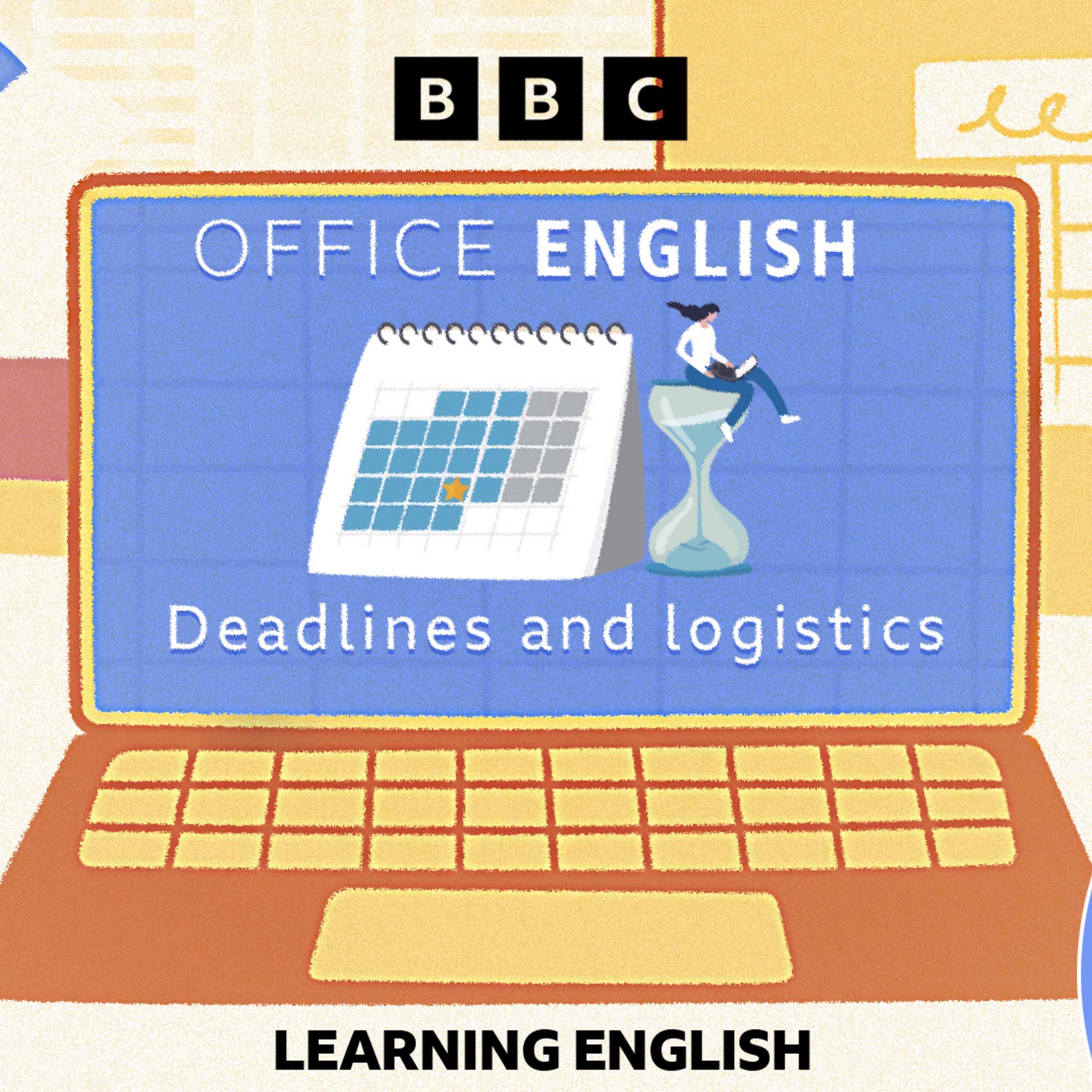
Office English: Deadlines and logistics

Learning English For Work
Deep Dive
- Use phrases like 'by the end of the day tomorrow' to set clear deadlines.
- Check feasibility with colleagues using 'does that sound feasible?'.
- Understand the difference between firm/hard deadlines and flexible ones.
- Consider using a buffer or fake deadline to ensure timely completion.
Shownotes Transcript
There are so many ways to learn with BBC Learning English. Follow us on Instagram, TikTok, Facebook, subscribe to our YouTube channel, discover our podcasts and find all the latest Learning English content on our website bbclearningenglish.com. Do you find it hard to stay organised at work? I love a to-do list.
And then I tick off when I've done that task and I get a great feeling of satisfaction. I'm not as organised as I should be about it. I think probably at first I think it's too much and then I think about it and I realise it's OK and then I don't do the planning I should have done in the first place. In this episode of Office English, we'll be talking about deadlines and logistics.
Hello and welcome to Office English, your podcast guide to the world of work. I'm Pippa. And I'm Phil. Visit our website to find a transcript of this episode to read along – bbclearningenglish.com. We heard from our colleagues Neil and Beth at the start of the episode about some of the ways they try to stay organised at work. Are you an organised person, Phil? Ooh, we've just been talking about this, haven't we? I'm organised enough for myself…
But I'm not always organised enough to work well with other people. OK, so it's all in your head and you haven't told anyone else what's going on. Is that what you're saying? Basically, yeah. I think I'm similar. I found recently, I don't know if it's an age thing, I'm still quite young, but I have to write things down a lot more. I have to have lists. Otherwise, there's too much going on and I forget something. So I like to try and stay organised. I don't like to feel panicked at work.
Today we're going to talk about some of the language of organisation at work. So Phil, let's start with deadlines. Sometimes at work you rely on the work of other people and you need to set clear deadlines to make sure that you can deliver everything on time. How can you make deadlines clear at work? Yeah, you can say stuff like, if we're going to meet that client's deadline, I need this work from you by the end of the day tomorrow or something like that.
Yeah, I might then check that deadline with them. So I could say something like, does that sound feasible? That means, does that sound doable to you? You want to make sure the deadline you're giving to someone is something that they can actually realistically do. Yeah, a really useful expression here is you can say that there is a firm deadline for something or a hard deadline. And what that means is we can't move it. If we miss the deadline, it's not going to work. Hmm.
Another way I might communicate it is I might just talk someone through my process. I might say, I'm mapping out our plan for this project. If you could finish your part by this date, that would be great.
Yeah, it might be a good idea to look at the deadline and then work backwards and think of when the other stages need to be done by. Yeah, and you definitely want to add in contingency. And that means a little bit of time in case something goes wrong. And I especially like to do this when you're working with someone who you think might miss the deadline that you give them. So you're just allowing for problems or just for someone to be ill or sick.
unable to do the work for another reason. I have a golden rule with deadlines. What's that? Never tell anyone your real deadlines. Yes, that's something a lot of people do. They'll give them a fake deadline that's maybe a week earlier than the real deadline. Yeah, so that's why I would always sort of start with the real deadline and then map backwards. So I'm giving myself enough time based off what I'm telling other people.
Sometimes at work, you're given a deadline. In other situations, you're asked to give an idea of how long something will take and set your own deadlines. What do we need to consider here? Well, Phil, the temptation in this situation is to overpromise. So to say, oh, yeah, I can do that really easily. But it's better to give yourself more time, I guess, and deliver something early than have to move a deadline because you were too optimistic about how much time you had.
What's that saying? It's best to under-promise and over-deliver. Exactly. And it can be stressful when you're not sure what an acceptable answer is for how long something will take. And a lot of us actually have time blindness and really struggle to judge how long things will take. So you should probably think about how you can discuss it with the person who's asked you and what language you can use. Yeah, so you could say...
If we delivered the report by next week, does that sound reasonable? And you might want to check your ideas with your colleagues to see if it actually sounds realistic. Yeah. Another way you could phrase it is,
saying something like realistically we need a while to do this properly I would suggest and then give your suggestion does that fit in with your timeline so you're showing that you thought about how long you think it will take but you want to check still that it fits in with the expectations because yeah it's really hard when someone asks you because you don't know what their kind of
ballpark figure was for something and a ballpark figure is just sort of a rough a rough estimation of what the time would be yeah another thing that might be good to check here we talked earlier about hard deadlines is like do we have a hard deadline on this is it's trying to find out if there is flexibility or if actually no it has to be done by then and that's it
Yeah, and if someone's asked you to estimate how long it will take to do something, and there could be several answers, it depends how much detail you go into, for example. So you could just throw the question back to them and say, when would you like it finished, ideally, and then kind of see if you've got similar ideas in mind afterwards.
So, we've talked a lot about schedules and deadlines. Another aspect of work organisation is something called logistics. This is what we call the coordination of lots of different things to make sure something runs smoothly. Yes, and this can mean that you need to be in communication with lots of people at the same time and update them about changing details. How can you do this professionally and without annoying someone?
Well, I would always keep my tone friendly, but be clear. So one thing you can do if you're emailing people, but you're not sure about a date is ask, can I pencil in this date and come back to confirm later? So if you pencil something in, it means it's not absolutely certain, but you've sort of maybe left them a reminder so they can keep the date free, for example.
Yeah, you could always say, I'll follow up with more details closer to the time. Sometimes as well, you'll have to move things around and you don't want to annoy someone doing this. So I would always apologise, just say, I'm so sorry. Is it possible to move the appointment? We've had some unavoidable delays. So you want to kind of, you know, show that you're being considerate of someone else's time.
Yeah. And when you're communicating that, make sure that you're clear with your email subjects and any calendar invites that you've sent. Always reply to confirm so that there's no confusion. It's kind of you're closing the loop of the communication. Yes. So if you ask someone, can they do a date? And they come back and say yes, then you email them back and say, that's great. I'll book in this date. So everybody is sure that it's definitely happening.
That's it for this episode of Office English. What parts of work do you find difficult? Send us an email to learningenglish at bbc.co.uk. And next time, we'll talk about managing clients at work. See you then. Bye.